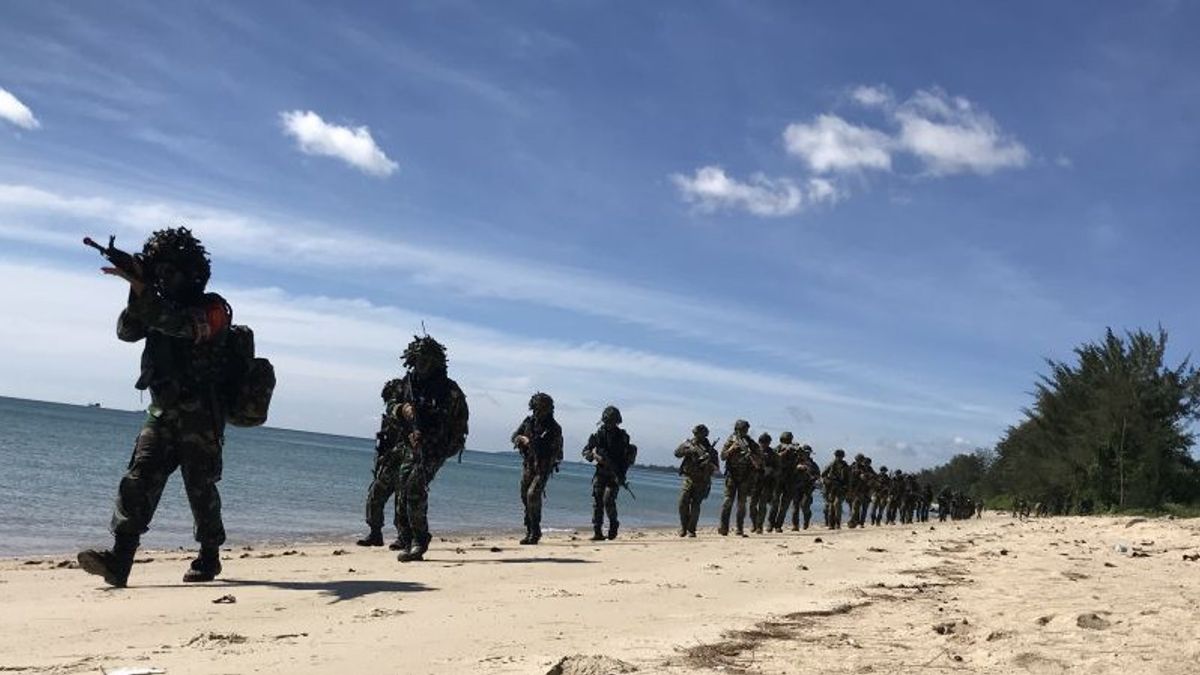The TNI Commander General Andika Perkasa wants the concept of joint exercises in a amphibious attack codenamed "Ausindo Amphibious Associate" between Indonesian Navy soldiers and the Australian army, the Royal Australian Army, to be more challenging every year.
"We want the exercise to be more difficult every year, this year it is more difficult than last year, next year it must be even more difficult. We have started talking about earlier, what is the concept for next year," said Andika after closing joint training on Todak Beach, Dabo Singkep, Lingga, Riau Islands, Antara, Sunday, November 20.
The exercise, which involved approximately 1,000 Indonesian Navy soldiers and the Australian Army, also deployed several main weapons systems (alutits) of the two countries.
The Indonesian Navy deployed KRI Banjarmasin-592 which was supported by around 500 soldiers, including the Indonesian Navy Marine Corps, Kopaska, Taifib, helicopters, health teams, and F16 air support belonging to the Indonesian Air Force.
Meanwhile, Australia deployed the HMAS Warship Adeleide, helicopter, LLC (Lite Landing Craft), zodiac, logistics trucks as well as the health team and almost the same number of personnel as the Indonesian Navy.
Andika explained that this exercise essentially carried out landings and attacks from ships in the waters to the mainland.
"From Australia, the LHD (landing helicopter dock) ship is quite large, more than 200 meters, its name is HMAS Adelaide. Meanwhile, the Indonesian Navy uses KRI Banjarmasin," explained General Andika.
For technical exercises, the TNI Commander said the two ships had initially met in Lingga waters two days ago (18 and 19 November 2022), then a exchange of combat tactics was made between the staff of each ship to learn what would be launched from these two ships.
Furthermore, in the early hours of Sunday at around 00.00 WIB, the ship began to approach the target and at 01.00 WIB several troops were dispatched to the target using armored vehicles, large-engined and small-engine rubber boats to non-machined ones.
After the target was taken over by the first troops, the second troops were again deployed to provide assistance in the morning. Then followed by assistance from the F16 fighter aircraft belonging to the Indonesian Air Force.
Not only that, but the attack also uses mobile air tactics, which is a form of operation with combat troops moving tactically by air by aircraft or helicopter, then heading to the target under the control of the task command to be involved in ground battles.
"What was carried by the helicopter earlier was taken near the target until it was finally controlled. That is generally the exercise," added Andika.
On the same occasion, the Head of Joint Operations at the Joint Operations Command Headquarters Lieutenant General Greg Bilton said that working with the TNI was an honor.
"Both troops have carried out amphibious exercises, namely joint exercises, it is very useful for both of our troops. Actually, this activity is very useful, both from the enlisted level and from the officer level, both from planning and implementation. This is extraordinary because one of the activities that has been agreed upon and approved by the Commander of the Indonesian Armed Forces and the Commander of the Armed Forces of Australia," he said.
The amphibious assault exercise held by the Indonesian Navy and the Australian Navy is part of the Indo-Pacific Endeavor (IPE) event and is a routine exercise program every year organized by the Royal Australian Navy with the Navy partner countries in the Indo-Pacific region since 2017, one of which is the Indonesian Navy.
The English, Chinese, Japanese, Arabic, and French versions are automatically generated by the AI. So there may still be inaccuracies in translating, please always see Indonesian as our main language. (system supported by DigitalSiber.id)
Most Popular Tags
#NCP #Presidential Threshold #Hasto Kristiyanto #squid game 2Popular
07 Januari 2025, 05:00













